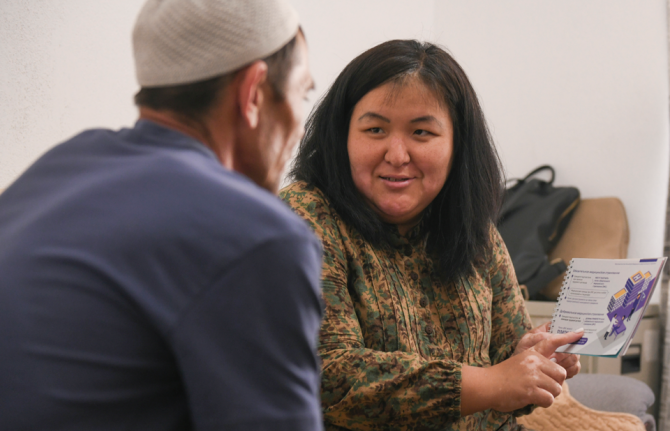
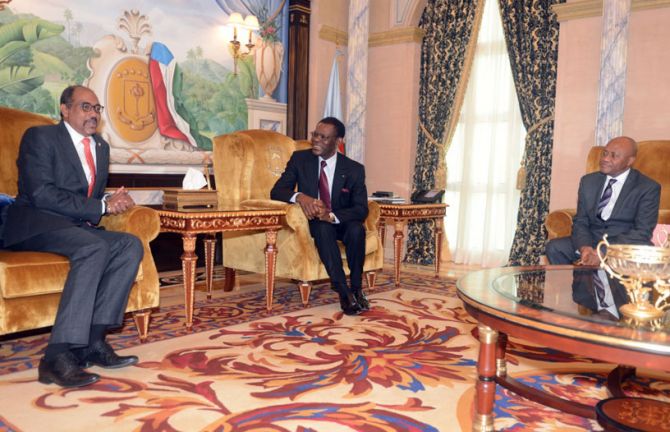
Update
Accelerating the HIV response in Equatorial Guinea
27 November 2015
27 November 2015 27 November 2015UNAIDS Executive Director Michel Sidibé met with the President of Equatorial Guinea, Teodoro Obiang Nguema Mbasogo, on 26 November in Malabo. During the meeting, Mr Sidibé stressed the need for Equatorial Guinea to decentralize HIV testing and access to treatment to the district level.
With HIV prevalence estimated at 6.2% in 2014, Equatorial Guinea has taken steps to scale up its response to HIV. The country is fully funding its HIV response and access to treatment is free of charge. The opening of additional health centres has allowed Equatorial Guinea to scale up its programme to eliminate mother-to-child transmission of HIV. Estimated coverage of pregnant women who access antiretroviral medicines increased from 61% in 2011 to 74% in 2014.
The President said the country is committed to working closely with UNAIDS towards ending the AIDS epidemic by 2030. He thanked UNAIDS for opening an office in Equatorial Guinea.
During his visit to the country from 25 to 26 November, Mr Sidibé signed a host agreement with the Minister of Foreign Affairs. He also met the Prime Minister, the Minister of Health and the minister in charge of HIV.
Quotes
“It is Equatorial Guinea’s duty to end the AIDS epidemic in the country, and we will accelerate our efforts with UNAIDS’ support.”
“If the two largest cities in the country, Malabo and Bata, implement the test and treat strategy, Equatorial Guinea can sharply reduce the number of new HIV infections.”
Region/country

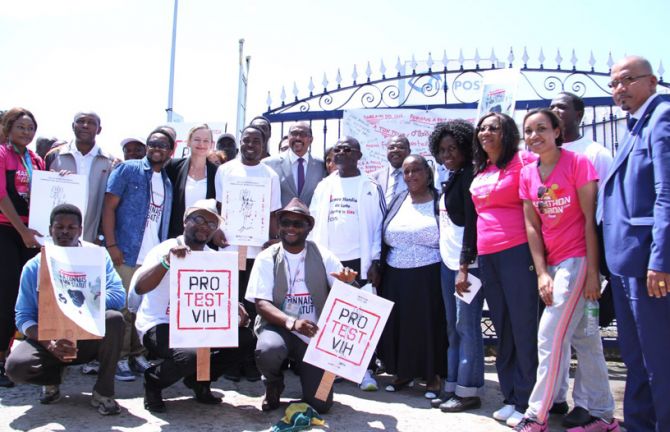
Update
UNAIDS unveils global initiative to scale up HIV testing among young people
30 November 2015
30 November 2015 30 November 2015ProTest HIV, a global initiative that encourages young people to get tested for HIV, was launched by UNAIDS Executive Director Michel Sidibé in Libreville, Gabon, on 28 November. At the event, Mr Sidibé called on young people worldwide to join the movement and get involved in ending the AIDS epidemic.
Young ProTest HIV ambassadors selected by their peers participated in the launch, which was held at an HIV testing site set up at the Gabon marathon. UNAIDS is working with young people on the initiative to spread the word on the importance of HIV testing.
UNAIDS estimates that 17.1 million of the 36.9 million people living with HIV worldwide do not know they have the virus. Getting tested is a crucial first step for people living with HIV to access life-saving antiretroviral therapy.
Mr Sidibé urged young ambassadors to take the lead in Gabon on the first 90 of the UNAIDS 90–90–90 treatment target and to invite their peers to get tested, too. The UNAIDS 90–90–90 treatment target is that, by 2020, 90% of people living with HIV know their HIV status, 90% of people who know their HIV-positive status are accessing antiretroviral treatment and 90% of people on treatment to have suppressed viral loads.
In Gabon, new HIV infections among children, adolescents and young people have largely declined since 2001, but AIDS-related deaths of adolescents have increased. This is partly due to the lack of integrated youth-friendly services and HIV-related stigma and discrimination. Adolescent girls in Gabon are particularly vulnerable—in 2014, 80% of adolescents newly infected with HIV were girls.
Quotes
“You have the right to health, to life, to make your own decisions about your sexual and reproductive health, employment and education. Be the generation that ends AIDS. Take control of your own health and protect yourself and those you love.”
"We fully subscribe to the ProTESTHIV and we are proud that our country has been chosen by UNAIDS to launch this global initiative. Indeed, everyone must know their HIV status."
“Getting tested for HIV is not rocket science. You have to know your status, whether it is positive or negative. If it is positive, you must treat yourself and protect others from HIV. If it is negative, continue to protect yourself against HIV and other sexually-transmitted infections.”
Region/country
Related


Update
Gabon on the path to consolidating gains made in AIDS response
30 November 2015
30 November 2015 30 November 2015UNAIDS Executive Director Michel Sidibé has praised President Ali Bongo Ondimba for his leadership on HIV and shared his conviction that Gabon is on the right path to ending the AIDS epidemic by 2030. During a meeting with President Bongo Ondimba on 28 November, Mr Sidibé urged the country to accelerate the implementation of the UNAIDS Fast-Track approach. President Bongo Ondimba reaffirmed Gabon’s commitment to eliminating mother-to-child transmission of HIV and to reaching the UNAIDS treatment target by 2020.
Gabon has made progress in its HIV response that needs to be consolidated. Between 2004 and 2014, new HIV infections fell by more than 64% and AIDS-related deaths fell by 50%, although there has been a worrying rise in adolescent AIDS-related deaths. Access to antiretroviral therapy has dramatically increased, but 53% of adults and 72% of children living with HIV are still in need of treatment.
A number of global initiatives, such as HIV and cities and All In, to end adolescent AIDS, have recently been launched by the Gabonese authorities with the support of UNAIDS and partners. Such initiatives will help translate commitments to Fast-Track the HIV response into targeted actions and rapid results. Accelerating the AIDS response in Gabon will also contribute to improving the performance of health and social services in the country.
During his two-day visit to Gabon, Mr Sidibé also met with the Minister of Foreign Affairs, the Vice-Premier, the Minister of Health, Social Affairs and National Solidarity, the First Lady and young people living with HIV engaged in a promising entrepreneurship programme. He also launched the global UNAIDS ProTestHIV initiative, which encourages young people to know their HIV status.
Quotes
“We need a paradigm shift. HIV testing and treatment must be decentralized and adapted to people’s needs, rather than expecting people to adapt to existing AIDS structures.”
“We have achieved concrete results in the AIDS response in Gabon but we should not be complacent. It’s time to accelerate the response and reach our goal to eliminate the AIDS epidemic.”
Region/country
Related

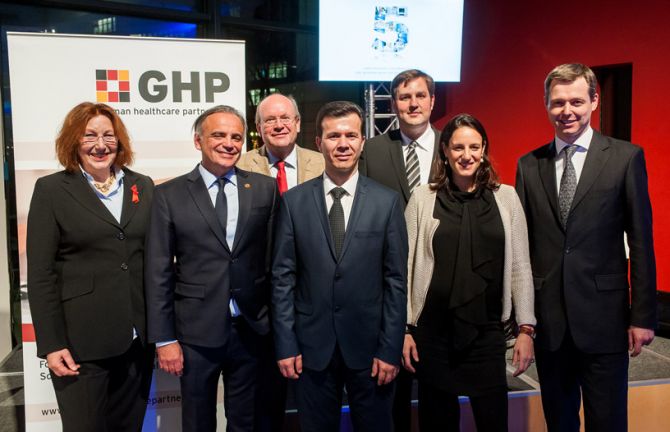
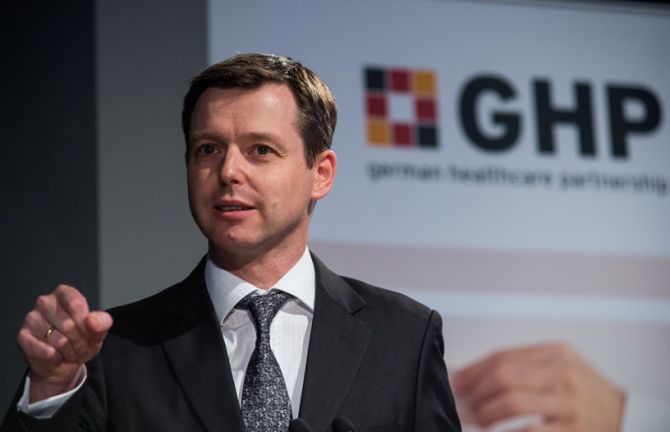
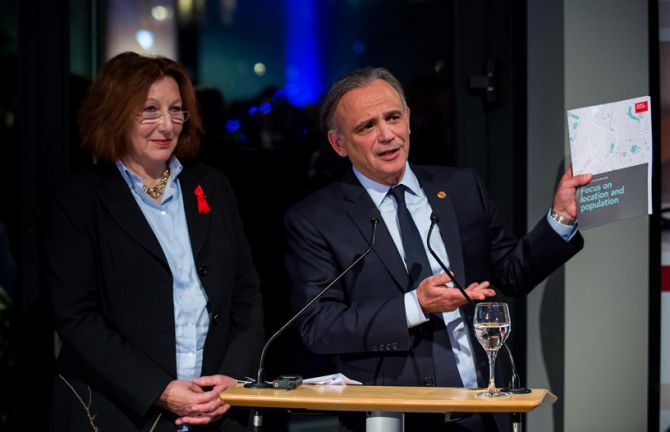
Update
German partnership to strengthen health systems
26 November 2015
26 November 2015 26 November 2015The German Healthcare Partnership (GHP) celebrated its five-year anniversary on 24 November in Berlin, Germany. GHP was founded in 2010 by the German Federation of Industries and the Federal Ministry for Economic Cooperation and Development to strengthen health systems in developing countries.
Speaking at the event, UNAIDS Deputy Executive Director Luiz Loures pointed out that the AIDS response has been unique in terms of the partnerships it has created, bringing together political commitment, social mobilization and science. He also highlighted the added value of private sector engagement in public health and especially in the context of HIV, where it has made significant contributions in terms of innovation, technical knowledge and resources.
The event was also attended by Parliamentary State Secretary and Vice Minister of the German Federal Ministry for Economic Affairs and Energy, Brigitte Zypries and Parliamentary State Secretary and Vice Minister of the German Federal Ministry for Economic Cooperation and Development, Thomas Silberhorn, who stressed that funding for development and cooperation is important, but that the private sector also needs to invest in improving health infrastructure, education and capacity-building, which are all key elements of health systems strengthening.
Mr Loures met with Tobias Bergner, Coordinator for the Foreign Policy Dimension of Global Health Issues for the German Foreign Office, and representatives of the Federal Ministry of Health. He praised Germany’s leadership on global health and its engagement with regard to global health architecture reform and encouraged Germany’s continued commitment to ending the AIDS epidemic by 2030.
While in Berlin, Mr Loures also presented the 2015 UNAIDS World AIDS Day report, together with Elisabeth Pott, Chief Executive Officer of the German AIDS Foundation.
Quotes
“The challenge today is to make HIV services accessible to everybody. UNAIDS is proud to collaborate with partners, including the German Healthcare Partnership, who can foster innovative partnerships with the private sector and help us reach people with HIV testing and treatment services.”
“Striving for the ideal goal of universal health coverage, especially in developing and emerging countries, is connected to highly complex challenges. From previous health crises like the last Ebola outbreak, it could be clearly derived that both needs to be strengthened—basic health-care services delivering the solid fundamentals required in any health system, as well as pillars focusing on specific fields, for example the fight against HIV, tuberculosis, malaria, neglected tropical diseases, and increasingly against cardiovascular diseases and cancer.”
Region/country
Related
 Government ensures continuity of treatment in Malawi
Government ensures continuity of treatment in Malawi

10 February 2025

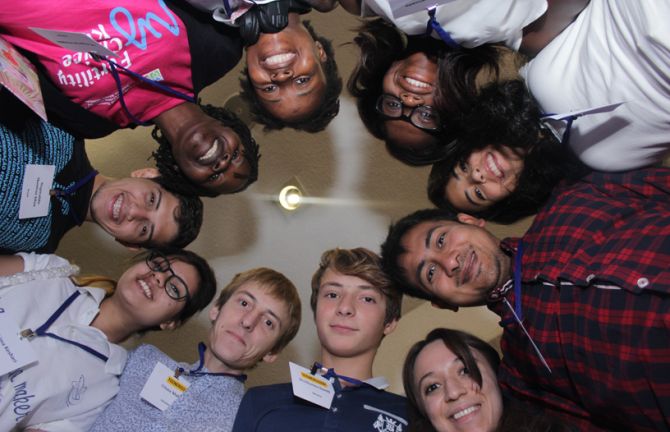
Update
Adolescents demand meaningful engagement in the AIDS response
27 November 2015
27 November 2015 27 November 2015The central role that adolescents must play in the AIDS response was discussed during a two-day consultation held on 25 and 26 November in Harare, Zimbabwe. As part of the All In platform, adolescents from around the world came together to identify ways to meaningfully engage with governments as well as international, civil society and youth organizations.
Adolescents face many challenges that hinder their engagement in the AIDS response. Owing to their age, adolescents are often perceived as only recipients of HIV programmes and not involved in their design, implementation or evaluation.
While there is growing evidence that youth participation contributes to effective policies and programming for young people, the participants stressed the need for investing resources, mentoring, capacity-building and developing adolescent-friendly materials to support their active participation in HIV programming.
AIDS is the leading cause of death for adolescents in Africa and the second leading cause of death among adolescents globally. Deaths are declining in all age groups, except among adolescents. While adolescents are one of the populations being left behind in the reduction of new HIV infections and AIDS-related deaths, they are also too often left out of important discussions related to policies and programmes that affect their health and lives.
Through a participatory process, an adolescent engagement road map was developed. Adolescent leaders agreed that in order to assure commitment, leadership, partnership and responsibility for ending the AIDS epidemic, they must be supported to organize and better engage with key stakeholders in policies, programming and service delivery.
In addition, the participants defined advocacy priorities to mobilize adolescent and youth communities in their respective countries in order to Fast-Track the AIDS response for adolescents. Key priorities include addressing gender equality, scaling up HIV testing, treatment, care and support, as well as adolescent-friendly information and services, and increasing funding for adolescent and youth-led programmes.
Described as an agenda for collective action, All In provides an opportunity for amplifying initiatives and investments by all stakeholders and addressing the social, political and legal contexts to ensure that no adolescents are left behind.
The All In adolescent consultation held in Harare was coordinated by UNAIDS and the PACT, in collaboration with the United Nations Children’s Fund, the United Nations Population Fund, UN Women, the International Labour Organization and the United Nations Development Programme.
Quotes
“There is no one else but you and me, right here, right now. Let’s make our generation the one that achieves the three zeros—zero new HIV infections, zero AIDS-related deaths and zero discrimination.”
“This is the time to be all in, including adolescent participation, not just a one-off meeting but throughout all processes while creating spaces for adolescents and young people.”
“This is a unique moment where the United Nations, government and civil society representatives, youth organizations and adolescents are realizing the true potential of adolescent engagement in the AIDS response. What is unique about these discussions is that adolescents, mostly adolescent girls and key populations, are defining their own priorities and joining hands to say you cannot end the AIDS epidemic without us at the forefront.”
“This meeting has helped me to develop my listening skills as I have (unusually) been keeping quiet and hearing directly from adolescents expressing their ideas and aspirations for All In.”
Region/country




Update
Eliminating mother-to-child transmission of HIV and scaling up paediatric care of HIV in western and central Africa
25 November 2015
25 November 2015 25 November 2015Representatives of ministries of health, national AIDS committees and civil society organizations from 19 countries in western and central Africa gathered in Dakar, Senegal, from 16 to 18 November to take stock of progress, challenges and opportunities for the prevention of mother-to-child transmission and paediatric care of HIV.
Together with experts from international organizations, they called for action to Fast-Track the AIDS response and achieve the 90–90–90 treatment target by 2020. To reach the target in the context of mother-to-child transmission of HIV and paediatric care of HIV, it is critical to scale up HIV testing and antiretroviral therapy for pregnant women and children living with HIV.
The participants agreed on key elements of a regional strategy to accelerate the identification and effective management of pregnant women and children living with HIV. They also called on national and international actors to mobilize and cooperate so that children are no longer born with HIV or die of AIDS-related causes in western and central Africa.
Quotes
"Ending the AIDS epidemic will only be possible if we eliminate mother-to-child transmission of HIV and scale up paediatric care of HIV.”
“Several decades of experience and lessons learned in the AIDS response have shown us that no results can be tangible and lasting without a partnership both at the national level and the global level. United, we must strive to meet the challenge in western and central Africa and to have an AIDS-free generation.”
“Let us join forces for better health for women and children, who are the base and the future of our nations, and for better health for the population of western and central Africa.”
“It is not right that 30 years later children still die as if there had been no progress so far.”
Region/country
Related

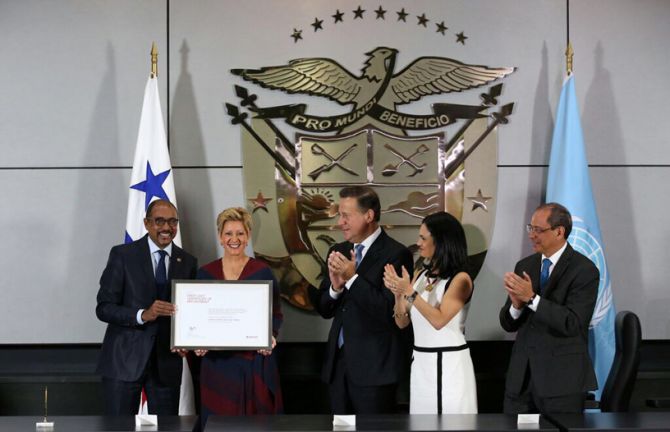
Update
First Lady of Panama named UNAIDS Special Ambassador for AIDS in Latin America
19 November 2015
19 November 2015 19 November 2015The First Lady of Panama, Lorena Castillo de Varela, has been named as a UNAIDS Special Ambassador for AIDS in Latin America. UNAIDS Executive Director Michel Sidibé appointed her during a visit to Panama, noting her commitment to expanding HIV testing coverage and bringing services closer to people. More than 15 000 people were tested for HIV in June 2015 as part of the Tests Save Lives campaign, which was led by the First Lady and the Ministry of Health.
The ceremony was held at the Presidential Palace on 16 November with the participation of President Juan Carlos Varela, Vice-President Isabel de Saint Malo de Alvarado and Minister of Health Francisco Terrientes. The dignitaries, along with the First Lady, reaffirmed their commitment to Fast-Track the AIDS response and work towards ending the epidemic as a public health threat by 2030.
Panama has made important progress in the AIDS response. HIV prevalence was 0.6% in 2014, with an estimated 53% of adults living with HIV receiving antiretroviral therapy. Mr Sidibé lauded Panama’s efforts and noted that the country is in a position to eliminate mother-to-child transmission of HIV. These figures hide large disparities by geographic region and population group, however. For example, HIV prevalence among men who have sex with men was 7.7% in 2014.
Mr Sidibé said that social issues that increase vulnerabilities need to be addressed and that improved comprehensive sexuality education can have a significant impact on reducing new HIV infections. He also encouraged increasing sustainable funding to civil society organizations working on HIV and on human rights issues related to the epidemic.
The government agreed that it is important to include vulnerable and marginalized people in the AIDS response. Nationwide there are six primary health centres for key populations, such as men who have sex with men, sex workers and transgender people. An additional three centres will open soon. The clinics focus on the unique needs of the clients, provide accessible health care and offer HIV testing and treatment for sexually transmitted infections.
While in Panama, Mr Sidibé also met with representatives of civil society, applauding their role in advocating for the adoption of a legal framework for the HIV response.
Quotes
“I am convinced that Lorena Castillo de Varela is the right person to lead our advocacy in Latin America because of her commitment to social justice and her passion and compassion to reach those who are left behind.”
“This is an opportunity and a great responsibility to serve our region, Latin America, in the urgent task of inspiring our leaders and citizens to strengthen the integration of strategies to promote a human rights based approach, dignity and non-discrimination to end the AIDS epidemic by 2030.”
“The achievement of the ambitious 90–90–90 treatment target requires the commitment of all. We need to take faster and more effective decisions to guarantee no one is left behind.”
Region/country
Related

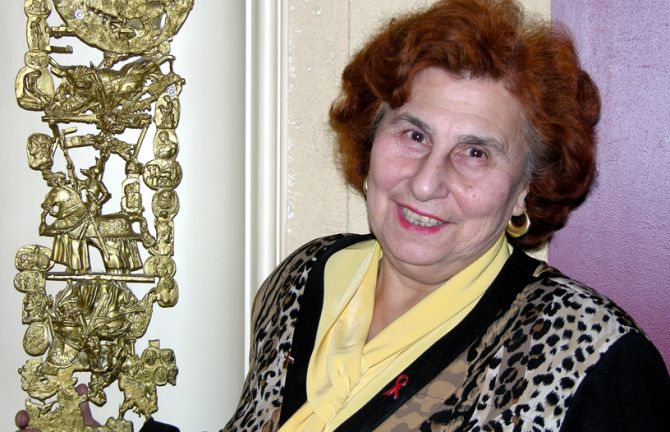
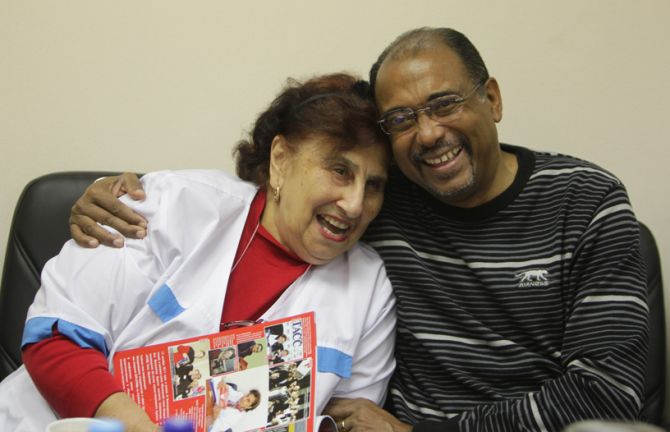
Update
UNAIDS commemorates the life of Aza Rakhmanova, a pioneer in the global AIDS response
20 November 2015
20 November 2015 20 November 2015UNAIDS is saddened by the death of doctor and activist Aza Rakhmanova, who passed away on 18 November at the age of 83 in Saint Petersburg, Russian Federation.
Ms Rakhmanova had an illustrious career in medicine and public health and was internationally recognized as a leading specialist in the diagnosis and treatment of HIV. She served as the Chief of Infectious Diseases for the City of Saint Petersburg and established model programmes for diphtheria, hepatitis, harm reduction and HIV infection.
In 1987, Ms Rakhmanova was among the first medical specialists to diagnose and treat people living with HIV in the Soviet Union. At a time when fear and ignorance about HIV was common, she was a ceaseless advocate for treatment, care and support for people living with HIV based on compassion and dignity.
In the early 1990s, she served as the adviser to Mayor Anatoly Sobchak on HIV infection and helped establish Saint Petersburg as one of the first cities to excel in AIDS research, prevention and treatment. Through her work at the Botkin Hospital for Infectious Diseases and the Republican Clinical Infectious Diseases Hospital in Ust-Igora, thousands of people living with HIV received the highest quality of medical care and support. As the Chair of the Department of Infectious Diseases at the Saint Petersburg Medical Academy for Postgraduate Studies, she provided advanced training on HIV diagnosis, treatment, prevention, care and support to many medical specialists from throughout the Commonwealth of Independent States.
Quotes
“Aza Rakhmanova was an incredible specialist who extended hope, health and dignity to thousands of people affected by HIV. I will always remember her passion, kindness and compassion.”
Region/country
Related

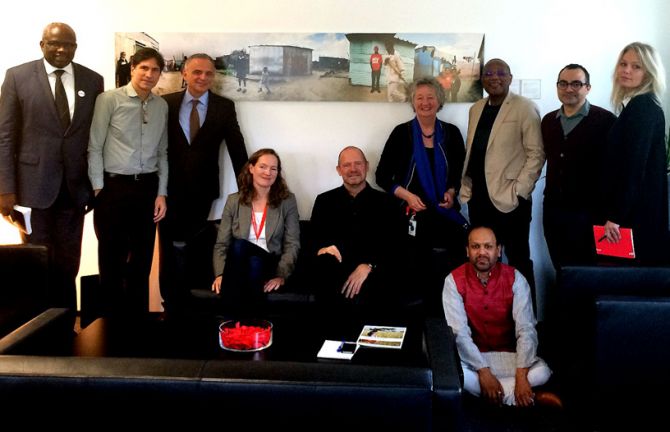
Update
Exploring ways to increase financial investment for community-based organizations
18 November 2015
18 November 2015 18 November 2015UNAIDS Deputy Executive Director Luiz Loures met with Ton Coenen, Executive Director of AIDS Fonds, on 13 November to discuss the current funding mechanisms for community organizations and to explore how UNAIDS can be further engaged in supporting civil society efforts.
Ideas discussed included how UNAIDS could help channel new funding to national civil society groups and convene stakeholders to identify policy changes that would increase strategic investment in community-based work.
The urgent need for increased financial investment in community-based services and advocacy was one of the main themes discussed at the UNAIDS Programme Coordinating Board (PCB) meeting in October. At the PCB, UNAIDS Executive Director Michel Sidibé committed to expanding UNAIDS’s efforts in support of funding for community responses.
Quotes
“Investing in communities is the only way to end the epidemic—for the best effect, communities should be directly involved in the decisions on where to invest. There are smart ways to do this without conflicts of interest.”
Region/country
Related


Update
DREAMS initiative for adolescent girls and young women in South Africa
17 November 2015
17 November 2015 17 November 2015Adolescent girls and young women must be empowered to provide the leadership that is needed to reduce new HIV infections in the highest burden countries in eastern and southern Africa. This is the message that Luiz Loures, UNAIDS Deputy Executive Director, shared during the launch of an international initiative in Johannesburg, South Africa, on 17 November that aims to keep adolescent girls and young women free from HIV.
Adolescent girls and young women are at higher risk of HIV infection for a range of biological and socioeconomic reasons, including poverty, gender inequality and limited access to youth-friendly health services. Adolescent girls and young women account for a quarter of new HIV infections in South Africa, according to the Human Sciences Research Council of South Africa. Yet, behind the numbers, there is a vibrant group of people aged 15 to 24 who are eager to get involved in solving problems that affect them and their communities.
Better known as DREAMS, the Determined, Resilient, Empowered, AIDS-Free, Mentored, and Safe initiative is supported by the United States President’s Emergency Plan for AIDS Relief (PEPFAR), the Bill & Melinda Gates Foundation and Girl Effect.
DREAMS will be implemented in two provinces and five high-burden districts in South Africa. Its ambitious target is to reduce new HIV infections among young women and girls by 40% over two years in 10 countries across eastern and southern Africa.
Quotes
“DREAMS is a blueprint of hope. If we prevent new HIV infections among young women and girls, we can reduce new HIV infections globally by 90%. All the girls here have dreams and I have a dream too—that we keep our young girls safe and AIDS-free.”
“The problem in society is that we don’t want to teach our girls about sex. We don’t want to give young women condoms because we think we are encouraging girls to have sex. Young women and girls need to change people’s mindset. Go to the clinic and demand your health rights.”
“DREAMS is not just about reducing new HIV infections among young women and girls. It is about transforming society. It is about bringing hope to the world. UNAIDS stands with Deborah Birx, South Africa and PEPFAR to achieve the DREAMS targets.”
“Young women and girls are not looking for patrons. They are looking for partners. Everything that young women and girls say will be taken into account. They are the dream keepers.”
“For so many aching years young women and girls wanted to be involved in issues that concern them. DREAMS is responding to the needs of our young women and girls by involving them. Our role is to stand up, act and take responsibility.”















